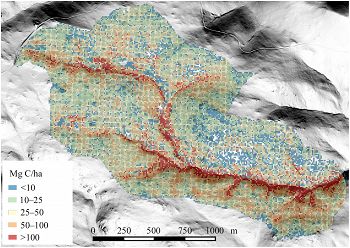Swetnam et al., 2017
Topographically driven differences in energy and water constrain climatic control on forest carbon sequestration
Swetnam T.L., Brooks P.D., Barnard H.R., Harpold A.A., and Gallo E.L. (2017)
Ecosphere 8(4): e01797 Cross-CZO
-
Catalina-Jemez, INVESTIGATOR
-
Catalina-Jemez, INVESTIGATOR
-
Boulder, INVESTIGATOR
-
Boulder, Catalina-Jemez, INVESTIGATOR
Abstract
Catchment mean carbon. Distribution of C for Gordon Gulch, aboveground C in equivalent units of Mg C/ha, shown for 10-m pixel size resolution.
Mountains are vital to ecosystems and human society given their influence on global carbon and water cycles. Yet the extent to which topography regulates montane forest carbon uptake and storage remains poorly understood. To address this knowledge gap, we compared forest aboveground carbon loading to topographic metrics describing energy balance and water availability across three headwater catchments of the Boulder Creek Watershed, Colorado, USA. The catchments range from 1800 to 3500 m above mean sea level with 46–102 cm/yr mean annual precipitation and −1.2° to 12.3°C mean annual temperature. In all three catchments, we found mean forest carbon loading consistently increased from ridges (27 ± 19 Mg C ha) to valley bottoms (60 ± 28 Mg C ha). Low topographic positions held up to 185 ± 76 Mg C ha, more than twice the peak value of upper positions. Toe slopes fostered disproportionately high net carbon uptake relative to other topographic positions. Carbon storage was on average 20–40 Mg C ha greater on north to northeast aspects than on south to southwest aspects, a pattern most pronounced in the highest elevation, coldest and wettest catchment. Both the peak and mean aboveground carbon storage of the three catchments, crossing an 11°C range in temperature and doubling of local precipitation, defied the expectation of an optimal elevation-gradient climatic zone for net primary production. These results have important implications for models of forest sensitivity to climate change, as well as to predicted estimates of continental carbon reservoirs.
Citation
Swetnam T.L., Brooks P.D., Barnard H.R., Harpold A.A., and Gallo E.L. (2017): Topographically driven differences in energy and water constrain climatic control on forest carbon sequestration. Ecosphere 8(4): e01797. DOI: 10.1002/ecs2.1797
 This Paper/Book acknowledges NSF CZO grant support.
This Paper/Book acknowledges NSF CZO grant support.
Explore Further





